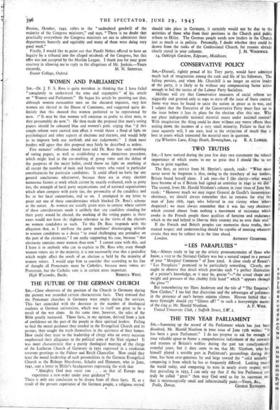WOMEN AND PARLIAMENT SIR,—Dr. J. F. S. Ross is quite
mistaken in thinking that I have failed "completely to understand the aims and arguments" of his article on "Women and Parliament." He began his article by pointing out that, although women outnumber men on the electoral -registers, very few women are elected to the House of Commons, and suggested quite de- finitely that this showed that women preferred to be represented by men. ("It may be that women will continue_ to prefer to elect men, as they presumably do now.") He then made the proposal that men's voting papers should be coloured blue and women's pink, urging that "if. this Simple reform were carried into effect it woukl throw a flood of light on psychological and other aspects of elections and electors, and would help us to improve both our methods and our judgements." I think most leaders will agree that this proposal may fairly be described as artless.
Five minutes' reflection should have told Dr. Ross that such marking Of voting papers, as well• as establishing a -most dangerous- precedent, which might lead to the ear-marking of group ibtei and the defeat of the purposes of the secret ballot, could throw no light on anything at all except the _number of male and female voters who voted in particular constituencies for particular candidates. it could afford no basis for any general conclusions whatsoever, because there are in every election numerous factors at work which cannot be exactly evaluated, such as party ties, the strength of local party organisations and of national organisations which often compete with party ties, the personality of the candidate and his or her local connections, and so on. .I attempted in my letter to point out one of these considerations which blocked Dr. Ross's scheme at the outset. As women are usually given seats to contest where certain of these considerations made it unlikely that any candidate standing for their party would be elected, the marking of the voting papers in these cases would non have the slightest relevance to the views of the electors On women candidates as such. To this Dr. Ross responds with the allegation that, as I attribute the party machines' discouraging attitude to women candidates to a desire "to avoid challenging any prejudice on the part of the electorate," I am really supporting his case, because "that electorate contains more women than men." I cannot cope with this, and I leave it to anybody who can to explain to Dr. Ross why, even though women voters are in the majority, it is not necessarily true that a prejudice which might affect the result of an election is held by the majority of women voters. I would urge him to consider that according to his line of thought all Protestants must be Catholics, because most voters are Protestant, but the Catholic vote is in certain areas important.


























 Previous page
Previous page